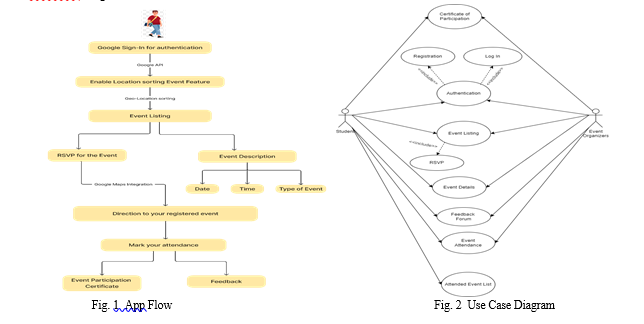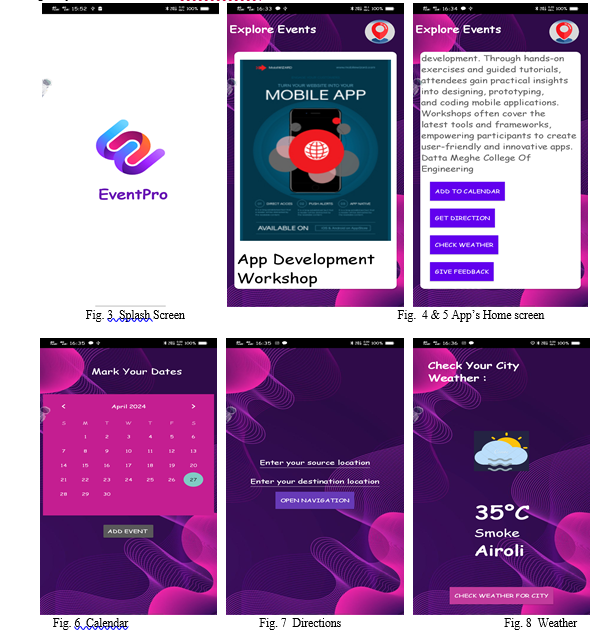Ijraset Journal For Research in Applied Science and Engineering Technology
- Home / Ijraset
- On This Page
- Abstract
- Introduction
- Conclusion
- References
- Copyright
EventPro – Application for Events
Authors: Aditya Parab, Mansi Bhayade, Apeksha Vaity, Prof. Subodh Karve
DOI Link: https://doi.org/10.22214/ijraset.2024.61124
Certificate: View Certificate
Abstract
In recent years, the event management landscape has undergone a profound transformation, driven by the emergence of event apps that have played a pivotal role in this evolution. This abstract delves into the concept of event apps, shedding light on their transformative impact and their potential to revolutionize the entire event lifecycle, encompassing planning, execution, and the overall event experience. Event apps are specialized software applications tailored to streamline the comprehensive event management process. Leveraging the widespread adoption of smartphones and the connectivity of the internet, these digital tools provide a seamless, enhanced event experience for attendees, organizers, and stakeholders. A prominent advantage of event apps is their capacity to simplify the event registration and ticketing process. Attendees can swiftly and conveniently register for events, select sessions, and make payments, effectively reducing the administrative workload for event organizers. Furthermore, event apps offer an array of features, including personalized schedules, in-teractive maps, and real-time notifications, ensuring attendees can effortlessly navigate events and stay informed about the latest updates. Beyond convenience, event apps foster valuable networking interactions among participants. They facilitate connections, meeting scheduling, and the exchange of contact information, opportunities that might have been challenging to achieve in a traditional event setting. They track attendee engagement, preferences, and behaviors, equipping organizers with insights to tailor future events for maximum impact. Additionally, event apps enable real-time communication, simpli-fying logistics management and responses to unexpected changes or challenges. As technology continues to advance, the potential for event apps to further revolutionize event planning, execution, and overall experiences is virtually limitless.
Introduction
I. INTRODUCTION
Event apps have emerged as a transformative technological innovation, reshaping the landscape of event planning and management. These specialized mobile applications have fundamentally changed how events are organized, experienced, and optimized. Event apps simplify the registration and ticketing processes, enhancing convenience for attendees and reducing administrative burdens for organizers. They offer a range of interactive features, including personalized schedules, live polling, and networking tools, creating vibrant and engaging event environments. Furthermore, these apps empower event organizers with valuable insights derived from data analytics, facilitating more informed decision-making and efficient event management. In today's digital age, event apps stand at the forefront of the event industry, offering a comprehensive solution that leverages technology to enhance the entire event lifecycle. These apps have made their mark by streamlining event operations, making them more efficient and cost-effective. Attendees benefit from streamlined registration processes, making it easier than ever to secure tickets, choose sessions, and access information in real-time. These applications also foster engagement and interactivity, allowing attendees to create personalized schedules, participate in live polls, and connect with fellow participants. Event organizers, on the other hand, gain access to powerful data analytics, which provide a deeper understanding of attendee preferences and behaviors. This data-driven approach enables organizers to make data-informed decisions for future events, creating experiences that truly resonate with their audience.
II. MOTIVATION AND APPLICATION
The inspiration behind the creation of EventPro lies in our unwavering belief in the power of technology to redefine the way we plan, execute, and experience events. In recent years, we have witnessed a significant transformation in the event management landscape, with the advent of event apps playing a pivotal role in this evolution. It became evident that there was a genuine need for a comprehensive platform that could harness the full potential of these digital tools to streamline and enhance the entire event lifecycle. The traditional event planning and management process has often been marred by inefficiencies, administrative complexities, and missed opportunities for engagement. We saw the chance to change that narrative by developing EventPro, a platform that not only simplifies registration and ticketing but also creates dynamic, interactive event environments. Our motivation stems from the desire to make event planning more efficient for organizers and event experiences more engaging and convenient for attendees.
Moreover, we recognize that the event industry is constantly evolving, and technology plays a pivotal role in shaping its future. As technology continues to advance, the potential for event apps and platforms like EventPro to further revolutionize the industry is virtually limitless. We are motivated by the opportunity to be at the forefront of this transformation, making a significant impact on how people engage with events of all types. We believe that by providing this powerful and user-friendly tool, we can empower event organizers and attendees alike to create and enjoy more memorable and impactful events.
The application of EventPro is poised to revolutionize the event industry by offering an all-encompassing solution to enhance event planning and execution. Event organizers can utilize EventPro to streamline their operations, simplifying the registration and ticketing process, which not only reduces administrative overhead but also improves attendee experience. Attendees, in turn, can enjoy a more engaging and interactive event environment, with features like personalized schedules and real-time notifications.
Beyond its immediate benefits, EventPro provides invaluable data and analytics to event organizers, empowering them to make data-driven decisions that optimize future events. It fosters networking opportunities, enabling attendees to connect with each other and schedule meetings seamlessly.
Our application extends to a wide array of events, from corporate conferences to music festivals, allowing EventPro to cater to a diverse set of users. With the ever-advancing landscape of technology, EventPro is positioned at the forefront of event innovation, offering a comprehensive solution that redefines how we plan, execute, and experience events of all kinds. EventPro aims to elevate the event industry, making it more efficient, engaging, and accessible for everyone involved.
III. LITERATURE SURVEY
A. Existing System
In our exploration of event management and ticketing platforms, BookMyShow serves as a noteworthy example of how technology has transformed the industry. This platform has set the benchmark for online ticketing systems, allowing users, including ourselves, to effortlessly discover, book, and manage tickets for a diverse range of events, encompassing movies, concerts, sports, and theater performances.
Our research into BookMyShow highlights the profound influence of digital solutions on event management. It provides a user-friendly ticket booking experience, streamlining the process with features like event discovery, interactive seating charts, secure payments, and e-ticketing. Attendees benefit from the convenience of accessing and enjoying events through this platform. From the vantage point of event organizers, BookMyShow offers a robust backend system that simplifies event setup, ticket management, and real-time analytics. It empowers organizers, just as it has empowered us, to expand their reach, make informed decisions, and enhance the quality of their events. By scrutinizing the achievements of BookMyShow, we glean valuable insights into how technology can enhance event planning and ticketing. While BookMyShow primarily focuses on movie and entertainment events, our platform, EventPro, aspires to extend these advantages to a broader spectrum of events. We are committed to offering a comprehensive solution for both organizers and attendees, building upon the legacy of platforms like BookMyShow, and shaping the future of event management through innovation and technological advancements.
B. Research papers referred
TABLE I
Literature survey
|
Sr.No. |
References |
Approaches and Findings |
|
1 |
Y. P. Wibisono, C. Hetty Primasari and A. Kesuma [1] |
Inclusion of user feedbacks, e-certificates. |
|
2 |
A. Saleem, D. A. Bhat, and O. F. Khan [2] |
Web-based application with only event listing. |
|
3 |
Drahsti Amrish Shah, Hemalata Vasudavan, Nurul Farhaini Razal [3] |
Creating a Web-based application, as a single platform. |
|
4 |
M. Pérez-Sanagustín, D. Parra, R. Verdugo, G. García-Galleguillos, and M. Nussbaum [4] |
Introducing QR codes for ease of ticketing and interaction. |
|
5 |
R Deepika, R Gayathri, T Saravanakumar, K Vigneshwaran, K Vignesh.[4] |
A simple mobile application which only includes user registration. |
C. Limitation of Existing System
- Limited User Engagement: Existing systems like BookMyShow may face challenges in maintaining consistent user engagement. Users may not actively participate beyond ticket booking, limiting their overall experience
- Fragmented User Experience: Users might encounter fragmented experiences across various event platforms and apps, including BookMyShow. This fragmentation can result from differences in user interfaces, event details, and interaction features
- Privacy Concerns: Data privacy and security issues can pose concerns for users when providing personal information, such as contact details and payment information. Existing systems may need to address and mitigate these privacy-related challenges
- High Operational Costs: Both BookMyShow and other event apps can have high operational costs, including server maintenance, infrastructure, and marketing. Event organizers may find it challenging to manage these costs effectively.
- Challenges in Customization: It is evident that existing systems might not provide sufficient customization options for event organizers. This limitation can hinder organizers from tailoring the system to their specific event requirements and branding needs.
IV. OUR SYSTEM
- Location-Based Event Filtering: Users will be able to easily discover events based on their geographical location. EventPro will utilize location data to filter and display relevant events, making it effortless for attendees to find nearby gatherings and activities.
- Real-Time Weather Information: Event organizers will benefit from real-time weather updates integrated into the system. This feature will provide crucial information for planning outdoor events, allowing organizers to make informed decisions about scheduling, venue arrangements, and more.
- Attendance System: EventPro will include a robust attendance tracking system. Organizers will be able to monitor and record attendee presence, making event management and post-event analysis more efficient. Attendees will also be able to check in seamlessly, ensuring a smooth entry experience.
- User-Friendly Event Location Guidance: To enhance attendee experiences, EventPro will provide user-friendly event location guidance. This feature will include interactive maps, directions, and information to help attendees easily navigate event venues and access important locations within the event.
- User-Friendly Interface: The system will prioritize an intuitive and user-friendly interface, offering a smooth and engaging experience for both organizers and attendees. Clear navigation, appealing design, and ease of use will be at the core of EventPro's design.

V. TECHNOLOGIES USED
A. Programming Languages: Java/Kotlin
Combining Java and Kotlin in app development offers a powerful synergy. Java's stability and compatibility are well-known, making it a reliable choice for building robust applications across various platforms. Its extensive usage in diverse industries underscores its proven track record and ensures broad accessibility. On the other hand, Kotlin brings modern features and conciseness to the development process. With its null safety, extension functions, data classes, and coroutines, Kotlin enhances productivity and code readability. Its concise syntax reduces boilerplate code, leading to cleaner and more maintainable codebases.
By leveraging both Java and Kotlin, developers can capitalize on their respective strengths. They can harness Java's stability while benefiting from Kotlin's modern features, creating efficient development workflows. Moreover, Kotlin's interoperability with Java allows seamless integration with existing Java codebases, facilitating a smooth transition for teams adopting Kotlin. This combination of languages enables flexible architecture choices. Developers can target various platforms, including Android, iOS, web, and backend services, using a shared codebase. Additionally, Java and Kotlin are well-suited for developing microservices and cloud-native applications, thanks to their scalability, performance, and ecosystem support for cloud technologies. Both Java and Kotlin boast vibrant communities and extensive ecosystems. They provide libraries, frameworks, tools, and resources to support app development across different domains and industries. Continuously evolving with regular updates and improvements, Java and Kotlin ensure developers have access to the latest language features, performance enhancements, and security patches.
B. Database Storage: Firebase
Firebase integration offers invaluable functionality for real-time data synchronization and backend services in app development. With Firebase, developers can effortlessly incorporate features like real-time updates, user authentication, and cloud storage into their applications. Firebase's real-time database enables seamless synchronization of data across devices in real-time. This feature is particularly beneficial for collaborative applications where multiple users need to interact with shared data concurrently. Whether it is a messaging app, a collaborative document editor, or a multiplayer game, Firebase ensures that all users see the latest updates instantly, enhancing the user experience.
Moreover, Firebase provides robust backend services for storing user credentials securely. With Firebase Authentication, developers can implement various authentication methods, including email/password, phone number, social authentication, and more. This simplifies the authentication process for users while ensuring their sensitive information remains protected. Additionally, Firebase offers a suite of other backend services, such as Cloud Firestore and Cloud Storage, which provide scalable and reliable solutions for storing and retrieving user data and media files. Cloud Firestore, in particular, offers a flexible and scalable NoSQL database that seamlessly integrates with Firebase's real-time capabilities, making it ideal for handling complex data structures and dynamic content. Overall, Firebase integration empowers developers to build feature-rich and collaborative applications with ease. Whether it's real-time data synchronization, user authentication, or cloud storage, Firebase provides a comprehensive set of tools to streamline app development and deliver exceptional user experiences.
C. Google Maps API
The integration of Google Maps in the app brings powerful location-based filtering capabilities to users. By leveraging Google Maps, users can discover nearby events and attractions based on their current location, enhancing their overall experience. Whether they're searching for local events, restaurants, or landmarks, the integration enables users to explore their surroundings with ease, enriching their interaction with the app. Furthermore, the app's integration with the Google Maps API extends beyond simple location discovery. Users can also benefit from turn-by-turn directions, providing them with seamless navigation to their desired destinations. This feature not only improves the usability of the app but also enhances the user experience by offering convenient and reliable guidance, ensuring that users can easily navigate to their intended destinations with confidence.
D. OpenWeather API
Integrating the OpenWeather API into the app enhances its functionality by providing users with real-time weather information tailored to their location. With OpenWeather, users can access current weather conditions, forecasts, and other meteorological data, enriching their experience and enabling them to make informed decisions based on weather conditions. By leveraging the OpenWeather API, the app enables users to stay informed about weather conditions in their current loction and beyond.
Whether they're planning outdoor activities, commuting, or simply staying updated on the weather, the integration allows users to access accurate and up-to-date weather information, enhancing their overall experience.
Moreover, the versatility of the OpenWeather API allows developers to tailor weather-related features to suit the specific needs of the app. Whether it's displaying weather forecasts, providing weather alerts, or integrating weather data into other app functionalities, the OpenWeather API offers a range of capabilities that can be customized to enhance the user experience and add value to the app.
VI. RESULT AND IMPLEMENTATION
The app was successfully built and we implemented the said features in it. The snapshots of the running app are attached below. The snapshots briefly show the splash screen of the app followed by the homescreen. The calendar feature allows one to set reminder for the events. The direction screen with the help of google maps, give you the direction for particular event, and finally the weather screen gives you the current weather information.sssss

Conclusion
In conclusion, EventPro represents a significant advancement in addressing the inherent challenges within event management systems. The integration of key features, such as user location tracking, mobile calendar integration, Google Maps API for event directions, real-time weather updates, and user feedback mechanisms, marks a pivotal moment in enhancing user en-gagement, streamlining operations, and fostering a more seamless event experience for both organizers and attendees. Meticulous research and a commitment to innovation have guided the development of EventPro, symbolizing a paradigm shift in the event management landscape. By prioritizing user-centric design principles and leveraging cutting-edge technol-ogies, EventPro not only bridges existing gaps but also establishes a new standard for comprehensive event management so-lutions. Moving forward, the evolution of EventPro will be guided by a dedication to excellence, responsiveness to user needs, and a relentless pursuit of improvement. With EventPro, the future of event management is poised to be brighter, more accessible, and user-friendly than ever before.
References
[1] Y. P. Wibisono, C. Hetty Primasari, and A. Kesuma, \"e-Vent: Support System for Event Registration,\" in 2019 2nd International Conference on Applied In-formation Technology and Innovation (ICAITI), Denpasar, Indonesia, 2019, pp. 157-162, doi: 10.1109/ICAITI48442.2019.8982127. [2] Shah, Drahsti & Vasudavan, Hemalata & Razali, Nurul Farhaini, \"Event Management Systems (EMS),\" in Journal of Applied Research and Technology. [3] Amir Saleem et al, \"International Journal of Computer Science and Mobile Computing,\" Vol. 6, Issue 7, July 2017, pp. 40-43. [4] M. Pérez-Sanagustín, D. Parra, R. Verdugo, G. García-Galleguillos, and M. Nussbaum, \"Using QR codes to increase user engagement in museum-like spaces,\" in Comput. Human Behav., 2016. [5] R Deepika, R Gayathri, T Saravanakumar, K Vigneshwaran, K Vignesh, \"Android Application for Event Management System,\" in International Conference on Systems, Science, Control, Communication, Engineering, and Technology 2016, pp. 328-330.
Copyright
Copyright © 2024 Aditya Parab, Mansi Bhayade, Apeksha Vaity, Prof. Subodh Karve. This is an open access article distributed under the Creative Commons Attribution License, which permits unrestricted use, distribution, and reproduction in any medium, provided the original work is properly cited.

Download Paper
Paper Id : IJRASET61124
Publish Date : 2024-04-27
ISSN : 2321-9653
Publisher Name : IJRASET
DOI Link : Click Here
 Submit Paper Online
Submit Paper Online

